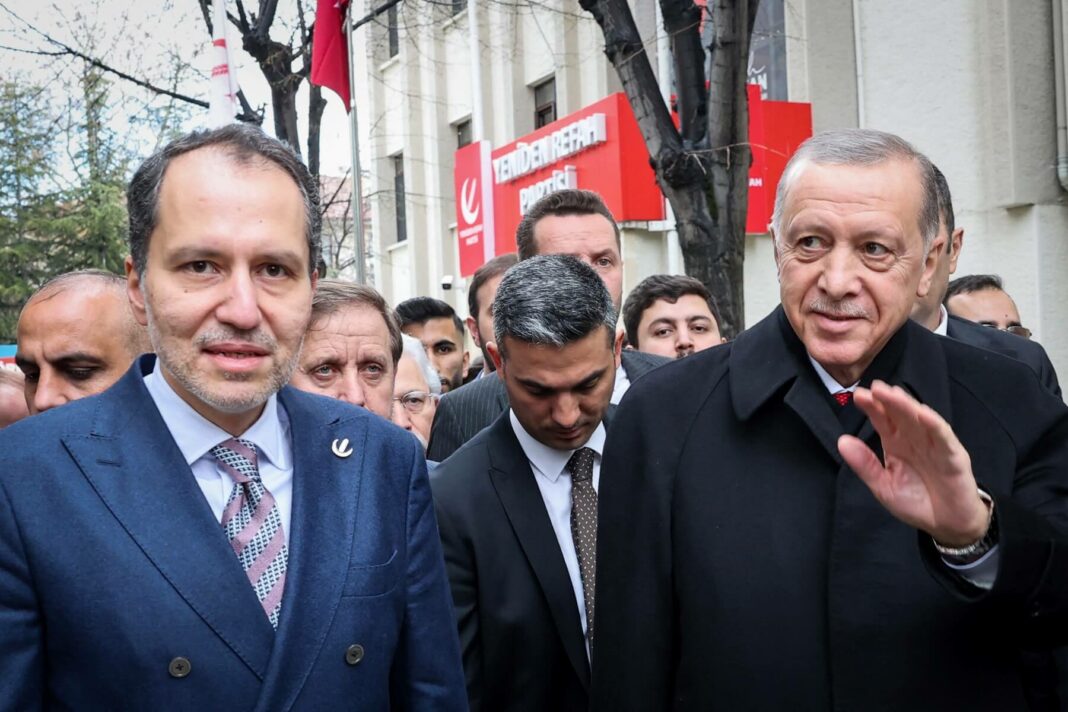Turkey’s March 31 local elections not only produced surprising results for the ruling Justice and Development Party (AKP), which has suffered its worst defeat since its establishment in 2001, and the main opposition Republican People’s Party (CHP), emerging as the most successful party in any election in decades, but also for a small Islamist party due to its unexpected success in the elections.
The New Welfare Party (YRP), which allied with President Recep Tayyip Erdoğan’s AKP in the May elections but later parted ways with it and fielded its own candidates for Sunday’s elections, turned out to be the third most successful party in the local elections, according to near-final results.
The YRP, established in 2018 by Fatih Erbakan, the son of legendary Islamist prime minister and leader of the Welfare Party (RP) Necmettin Erkaban, managed to garner 6.1 percent of the nationwide vote, amounting to 2.8 million votes.
Necmettin Erbakan, who died in 2011, was a mentor who inspired Erdoğan with his “Nationalist View” ideology merging the Turkish nationalist and Islamic identities. Erdoğan and his associates established the AKP in 2001 after parting ways with Erbakan’s Virtue Party (FP).
The YRP’s candidate won the election for mayor of Şanlıurfa in southeastern Turkey and the central province of Yozgat, both formerly known as AKP strongholds. The party also helped the CHP win in İstanbul’s conservative Üsküdar district by splitting the right-wing votes.
The YRP also won 39 district and 19 town municipalities across the country, which came as a surprise to many observers due to the party’s relatively recent emergence in the Turkish political landscape.
Just like the YRP, the RP, established in 1983, also recorded its first significant election success in Şanlıurfa in the 1984 local elections.
Many say the YRP’s anti-Israel rhetoric and its criticism of the AKP government’s ongoing trade with Israel despite its war on Gaza have prompted Turkey’s Islamist and conservative voters to see the YRP as an alternative to the AKP.
Several days before the elections, YRP leader Fatih Erbakan laid out conditions to the AKP in return for him withdrawing his party’s candidate from the İstanbul election. He called on the AKP government to cut off trade with Israel, to close down the Kürecik Radar Station in eastern Turkey, established in 2012 for use by NATO as an early-warning radar against ballistic missile attacks, which he said is used to protect Israel, and to raise pensions to a minimum of TL 20,000 ($616).
The AKP ignored the YRP’s demands.
“The result of this election was decided by the behavior of the people who continue to trade with Israel and the Zionist murderers,” Fatih Erbakan said on Sunday.
Despite the ongoing conflict and Erdoğan’s condemnation, Israel remains an important trading partner for Turkey, ranking 13th on Turkey’s export list in 2023. Trade between the two countries totalled $5.42 billion last year, accounting for 2.1 percent of Turkey’s total exports, a decrease from $7 billion in 2022.
The trade between Turkey and Israel, some of which is conducted by people close to Erdoğan despite his anti-Israel rhetoric, was first revealed by investigative journalist Metin Cihan in late November. Cihan has since been reporting on the commerce between the two countries based on publicly available sources.
The YRP’s success “could change Erdogan’s calculus [and] reshuffle his electoral alliance” after it outperformed his ally, the Nationalist Movement Party (MHP), Gönül Tol of the Middle East Institute in Washington said on X.
Major electoral leap for the New Welfare Party, which fared better than Erdogan's nationalist ally, MHP, and became the third largest party. This new dynamic could change Erdogan's calculus, reshuffle his electoral alliance and alter dynamics within Meral Aksener's Good Party. https://t.co/1OlWg9iqpf
— Gönül Tol (@gonultol) March 31, 2024
The party, which took part in Erdoğan’s Public Alliance, comprising the far-right MHP and several small parties, in the May general election, was able to win five seats in parliament. The YRP won 2.8 percent of the nationwide vote, which amounted to 1.5 million votes.
After the party broke with the AKP, its officials complained about pressure and hindrances from the AKP while conducting its campaign for the elections.
The rise of the YRP has, meanwhile, led to concern among Turkey’s secular population and the LGBTQ community due to the party’s Islamist and anti-LGBTQ discourse. Just like the AKP, the YRP sees LGBTQ people as “perverted” and is against the expansion of their rights.
YRP leader Erbakan was also notorious for his anti-vaccine stance during the coronavirus pandemic. He claimed that COVID-19 vaccines could lead to people giving birth to “half-human, half-monkey” children.


